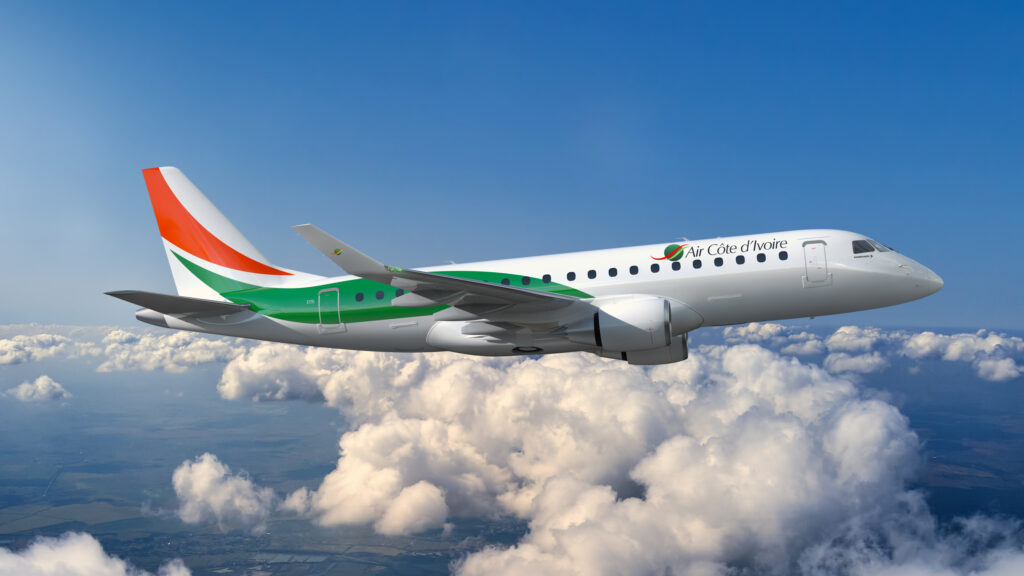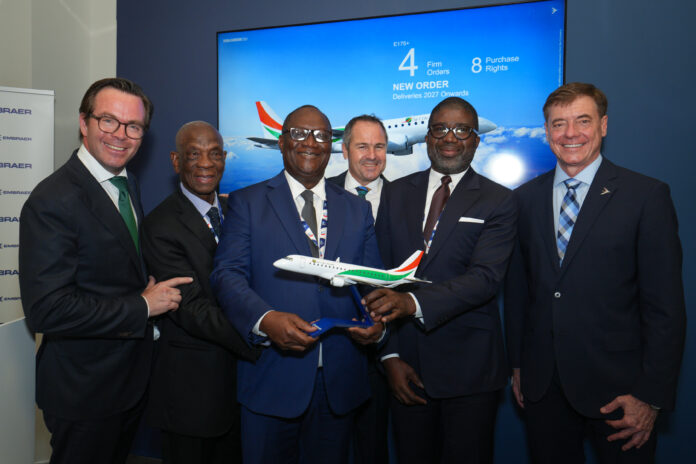Staff Correspondent
In the ever-evolving landscape of global aviation, strategic fleet modernization and route expansion are essential components for sustaining growth and competitiveness. Air Côte d’Ivoire, the national carrier of the Republic of Côte d’Ivoire, has recently undertaken a significant step in this direction by placing a firm order for four Embraer E175 aircraft, along with options for eight additional units. This decision underscores the airline’s intent to modernize its fleet, strengthen its regional network, and enhance the overall passenger experience, while also aligning with the nation’s broader socio-economic development goals. Scheduled for delivery beginning in 2027, this acquisition represents both a technological and commercial evolution for the airline and a reaffirmation of Embraer’s growing presence in the African aviation market.
Strategic Rationale & Fleet Modernization
Since its inception in 2012, Air Côte d’Ivoire has consistently sought to position itself as a key facilitator of national and regional connectivity. Its strategic focus on linking domestic airports to regional destinations has been central to Côte d’Ivoire’s ambition to reinforce Abidjan’s role as a West African hub. The order of the Embraer E175s is consistent with this long-term vision. The E175, with its 76 seats, including 12 in Business Class and 64 in Economy, is ideally suited to the demand characteristics of African regional markets—providing an optimal balance between capacity, range, and operating efficiency.
The new aircraft will gradually replace the airline’s existing turboprop fleet. Turboprops have traditionally served short-haul and regional routes effectively; however, their limitations in speed, range, and comfort are increasingly evident in a market where passengers expect higher service standards. The E175, as a regional jet, will allow the airline to offer faster connections, greater passenger comfort, and increased cargo capacity—important factors in both commercial and economic competitiveness. Moreover, the jet’s operational efficiency and lower maintenance costs are expected to improve profitability for Air Côte d’Ivoire, thereby contributing to its long-term financial sustainability.
Enhancing Regional Connectivity & Hub Development
The E175s are expected to serve as the cornerstone of Air Côte d’Ivoire’s regional connectivity strategy. Abidjan, the country’s primary gateway, lies at the center of West Africa’s air transport network. The addition of modern regional jets will enable the airline to increase flight frequencies, open new routes, and offer more reliable connections to strategic destinations across the Economic Community of West African States (ECOWAS) region.
This strategic enhancement will also have a multiplier effect. Improved connectivity stimulates tourism, trade, and investment, fostering economic integration within West Africa—a key policy objective for many regional governments and institutions. The new aircraft will therefore not only strengthen Air Côte d’Ivoire’s competitive position but also contribute to the broader socio-economic growth of the region. Furthermore, by serving as feeder aircraft for its hub, the E175 fleet will complement the airline’s long-haul operations, particularly its recently launched service to Paris Charles de Gaulle. This convergence of regional and international networks is expected to improve traffic flows, optimize hub operations, and provide passengers with seamless travel experiences.

Partnership with Embraer: A Symbol of Confidence & Growth
The partnership between Air Côte d’Ivoire and Embraer goes beyond a commercial transaction; it reflects a mutual commitment to innovation, efficiency, and sustainable growth. Embraer’s leadership in the segment of aircraft with up to 150 seats has been well established, particularly in Africa, where it maintains a 31% market share and operates more than 250 aircraft across 56 operators. The E175, a proven model globally, combines reliability and performance, making it a trusted choice for carriers operating in environments with varying infrastructure capabilities.
Arjan Meijer, President and CEO of Embraer Commercial Aviation, emphasized the alignment of the aircraft’s capabilities with Air Côte d’Ivoire’s strategic goals. His remarks highlight Embraer’s strategic vision in supporting African airlines through tailored solutions that address both operational challenges and market dynamics. For Air Côte d’Ivoire, this partnership provides not only advanced aircraft technology but also access to Embraer’s extensive after-sales services and technical support network—critical factors in ensuring operational efficiency and aircraft longevity.
Broader Implications for African Aviation
The African aviation market has been gradually modernizing over the past decade, characterized by the introduction of newer aircraft types, the liberalization of air services, and increased regional cooperation. Embraer’s expanded footprint on the continent, growing at an impressive compound annual growth rate of 7.5% over the past ten years, mirrors the continent’s broader progress in aviation infrastructure and service quality.
Air Côte d’Ivoire’s move mirrors strategies adopted by forward-thinking African carriers seeking to bridge the gap between regional and international travel. Modern regional jets like the E175 play a crucial role in aligning capacity with demand, ensuring route profitability, and providing the type of connectivity necessary for sustained economic development. This evolution is particularly relevant as African nations pursue initiatives such as the Single African Air Transport Market (SAATM) to create an integrated and efficient aviation ecosystem.
Economic and Operational Advantages
From an economic standpoint, the introduction of the E175s is expected to enhance Air Côte d’Ivoire’s operating performance significantly. The aircraft’s greater fuel efficiency compared with older-generation aircraft and turboprops implies lower per-seat operating costs and improved environmental performance. In an era when airlines are under increasing pressure to reduce their carbon footprints, such efficiency gains align well with global trends toward sustainable aviation.
Operationally, the E175 offers flexibility in scheduling and deployment, allowing the airline to optimize capacity across variable demand levels within its network. This adaptability can be particularly valuable in markets characterized by seasonal fluctuations or emerging demand. By deploying a standardized, modern fleet, Air Côte d’Ivoire can achieve greater maintenance efficiency and standardized pilot training—factors that contribute to operational reliability and safety.
The acquisition of four Embraer E175 aircraft marks a pivotal moment in the evolution of Air Côte d’Ivoire and signifies a broader narrative of growth, modernization, and ambition within African aviation. This decision reflects a carefully considered strategy aimed at strengthening the airline’s regional presence, enhancing passenger experience, and positioning Abidjan as a dynamic aviation hub in West Africa.
Through this move, Air Côte d’Ivoire demonstrates its commitment not only to corporate progress but also to national development, economic integration, and regional leadership in air transport. In partnership with Embraer—a global leader in regional aviation technology—the airline embodies the principles of innovation and forward


